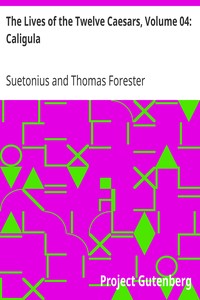This digital archive was curated by Sam Donath in partial completion of UNI HIST 1011 Field Experience: Public History.
 Suetonius, et al. Caius Caesar Caligula. “The Lives of the Twelve Caesars, Volume 04: Caligula by Suetonius.” Project Gutenberg
Suetonius, et al. Caius Caesar Caligula. “The Lives of the Twelve Caesars, Volume 04: Caligula by Suetonius.” Project Gutenberg
 Cassius Dio. Caligual. Book LIX (Volume 7) of Roman History. Translations by Earnest Clay and Herbert Baldwin Foster.. Harvard University Press. 1914.
Cassius Dio. Caligual. Book LIX (Volume 7) of Roman History. Translations by Earnest Clay and Herbert Baldwin Foster.. Harvard University Press. 1914.
 Cassius Dio. Gaius "Caligula" Caesar. Roman History. Edited by E. Capps, T.E. Page, and W.H.D. Rouse. Loeb Classical Library.1924.
Cassius Dio. Gaius "Caligula" Caesar. Roman History. Edited by E. Capps, T.E. Page, and W.H.D. Rouse. Loeb Classical Library.1924.
 Josephus, Flavius, and Charles Clarke. The Whole Works of Flavius Josephus ... Translated by Charles Clarke ... To Which Are Added, Historical, Critical, and Explanatory Notes, by the Reverend Mr. Yorke. 1803.
Josephus, Flavius, and Charles Clarke. The Whole Works of Flavius Josephus ... Translated by Charles Clarke ... To Which Are Added, Historical, Critical, and Explanatory Notes, by the Reverend Mr. Yorke. 1803.